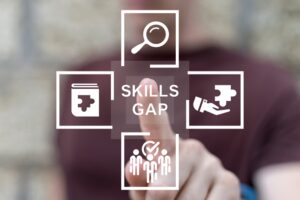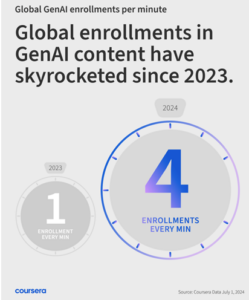
Closing the GenAI Skills Gap

(Panchenko Vladimir/Shutterstock)
We’re at an interesting moment in the generative AI adoption curve. Companies clearly want workers who are skilled in GenAI. However, they are not yet actively training workers in GenAI in large numbers. That is something that Coursera hopes to begin changing with a slate of new GenAI courses unveiled today, on top of the hundreds it already offers.
There’s plenty of demand for GenAI skills in the marketplace today. According to Quentin McAndrew, global academic strategist for Coursera, there’s been a 30% increase in job postings that mention GenAI.
“What we’re seeing is GenAI and using things like ChatGPT is the number one in-demand skill in the world right now,” said McAndrew, who is also a professor at the University of Colorado, Bouder. “Companies know they want it. They haven’t started actively upskilling their workforce yet.”
Despite the trillions in potential value that GenAI can deliver, only 5% of companies have rolled out AI reskilling at scale, according to a September 2023 Accenture survey cited by Coursera.
There are several reasons for the GenAI skills gap. Part of it is just the sheer newness of GenAI and the extremely rapid pace of technology change. It’s been barely a year-and-a-half since OpenAI dropped ChatGPT on the world, igniting a tidal wave of interest in GenAI.
Figuring out which GenAI skills workers need is another issue. The skills that workers need to apply GenAI tools to their jobs are different than the skills a company needs to build a GenAI application, for example. Thorny issues around mitigating hallucinations and ethics also compound the issue.
The good news is that employees have picked up the GenAI ball and are running with it. For instance, Accenture finds that 94% of workers are ready to learn new skills to work with GenAI, so the supply of human labor is willing to move into the AI era.
On the demand side, McAndrew cites a May 2024 Microsoft and LinkedIn survey that found 66% of corporate leaders wouldn’t hire someone without AI skills. What’s more, that same survey found that 71% of leaders would rather hire a less experienced candidate with AI skills than a more experienced candidate without them.
“There’s demand at the corporate level, job postings are accelerating,” McAndrew told Datanami in an interview. But “companies have not figured out yet how to upskill their workforce.”
Coursera clearly is eager to fill this skills gap with its educational offerings. The company, which was co-founded by Stanford University computer science professors Andrew Ng and Daphne Koller, partners with more than 300 universities around the country to offer online courses, certifications, and degrees in a variety of disciplines, including data analytics and AI.
The company already offers hundreds of courses with GenAI content in them. Out of the 7,000 or so courses that Coursera offers, 250 of them are specific to GenAI. Enrollment in these courses quadrupled from 2023 to 2024, and according to McAndrew, and the company has surpassed 2 million enrollments of students into GenAI courses. Coursera is now enrolling students into GenAI courses at the pace of four per minute, she said.
“You can come to Coursera to learn anything, from creating Gen AI applications or learning the fundamentals of how to use GenAI,” she said. “One of our most popular launches this year has been a certificate from Google on GenAI fundamentals. Vanderbilt University has a fabulous course from Dr. Jules White, who’s one of the nation’s leading educators in Gen AI, on prompt engineering.”
The GenAI courses that Coursera offers range from very technical classes intended to help someone learn how to develop GenAI applications, to practical classes aimed at helping people work with GenAI in specific areas, such as the class in GenAI marketing from the University of Virginia.
In honor of AI Appreciation Day, Coursera today made several announcements, including the launch of seven new courses, specializations and certificates in GenAI; eight entry-level professional certificates with GenAI updates; the GenAI Academy for Teams; and an updated Coursera Coach experience.
As GenAI works its way into our day-to-day work lives, there will be horizontal and vertical aspects to it. Just about everyone will need some familiarity with GenAI, McAndrew said.
“It’s going to become like you have to know Excel or Word. That’s how pervasive it’s going to be,” she said. “The key skills that we see that that employers are looking for to begin with are knowing how to do prompt engineering, to work with an LLM to get what you need from it, and then past that, knowing how to apply it to your job effectively to increase your efficiency.”
At the same time, workers will also need specific GenAI training for the business vertical they’re in, which is another area where Coursera and its university partners are actively building curriculum. “We’re actually in the process of mapping out the skills that are necessary across different fields to really look at the content that we offer so that it meets those gaps as demand grows,” she said.
Ethics is one of the stumbling blocks that companies are struggling with as they look to adopt GenAI. The good news at Coursera is that many of the courses that it offers have adopted ethics as a central component of their curriculum, so that it is baked into the class.
Coursera is clearly hoping to get out in front of this GenAI adoption curve. The World Economic Forum said 61% of people currently in jobs will need re-training in the next two to three years, McAndrew said. That represents a huge opportunity to get ahead, both for individual workers as well as companies looking to compete in a new AI-first world.
“I think everyone knows it’s coming. It’s wrestling with this brand new thing and figuring out how to implement it,” McAndrew said. “It is on the one hand intimidating, because it can impact so many parts of our work. On the other hand, it’s something that we can all apply relatively easily to be better and more productive at what we do.”
Related Items:
University of Michigan is Developing an AI Coaching Bot For Students
Anaconda Bolsters Data Literacy with Moves Into Education
Navigating the AI Skills Revolution in the Age of GenAI: LinkedIn Report





























